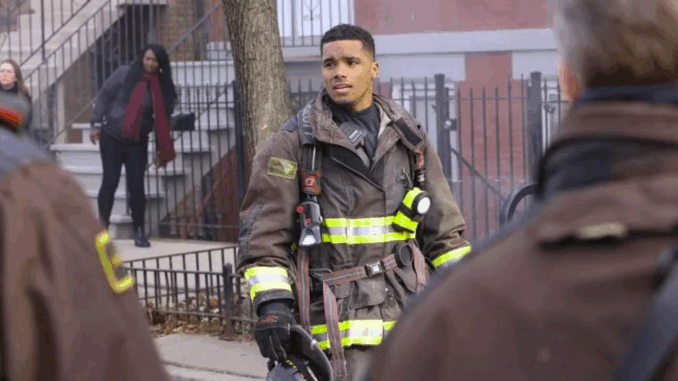
In a firehouse once dominated by larger-than-life figures like Casey and Severide, Darren Ritter has quietly carved out a space for himself—not through grand gestures or headline-grabbing heroics, but by becoming one of the most emotionally honest and morally grounded characters on Chicago Fire.
Ritter, played with gentle conviction by Daniel Kyri, has emerged as a standout in recent seasons. As Firehouse 51 enters a new era, his presence represents the heart of what Chicago Fire has always done best—portraying everyday bravery in all its forms.
The Quiet Strength of Darren Ritter
When Ritter first arrived at 51, he was terrified—literally freezing during his first real fire. Most shows might have written off such a start as weakness. But Chicago Fire used that moment to plant the seeds of something deeper: growth through vulnerability.
Since that pivotal episode, Ritter has slowly grown into one of the most dependable firefighters in the house. He listens more than he talks. He supports more than he demands. And when he does speak up—whether defending a patient, challenging a teammate, or confronting a superior—it always matters.
Ritter’s strength isn’t in brute force. It’s in his values.
Representation Done Right
Ritter’s identity as an openly gay firefighter is handled with nuance and respect. He’s not tokenized, and his sexuality isn’t treated as a plot twist—it’s simply part of who he is. This balance is rare in network television, and it’s one of Chicago Fire‘s quiet triumphs.
His friendship with Mouch and Herrmann, his mentorship by Kidd, and his close bond with Violet all reflect how seamlessly he fits into Firehouse 51—not despite his differences, but because of them.
And when he organized the bar’s Pride Night, it was more than just a social event. It was a powerful moment of belonging, both for Ritter and for viewers who saw themselves in him.
Holding the Moral Line
In a world where firefighters face impossible choices, Ritter consistently acts as the conscience of the team. He sees people. He remembers names. He notices the things others overlook.
In Season 12, his confrontation with a reckless rookie over racial profiling during a call was one of the show’s most powerful recent moments. It was Ritter who spoke out—not with rage, but with calm clarity. And that choice to lead with empathy made it all the more impactful.

Where other characters might jump into conflict or lose themselves in their own emotional arcs, Ritter steps back, assesses, and acts with purpose. He’s becoming the kind of firefighter others look to—not for orders, but for perspective.
The Value of Steady Characters
While Chicago Fire thrives on drama, explosions, and sweeping romantic arcs, its longevity also depends on characters like Ritter. He’s the steady rhythm beneath the chaos—the character who reminds us why Firehouse 51 works as a unit.
Ritter is also filling a role left vacant by Gallo’s exit: the grounded, thoughtful young firefighter who helps bridge the generational divide. With Carver still navigating his own inner storms and Gibson finding his footing, Ritter offers calm in the storm.
And that makes him essential.
What Lies Ahead
Fans have long speculated about Ritter’s potential future in leadership—possibly as a lieutenant, or even one day taking over Truck 81. While he doesn’t have the brash confidence of Kidd or the hardened resolve of Severide, he brings something equally important: integrity.
The show would do well to give Ritter more room to lead—not just in the field, but in storylines. His voice matters, and the show is strongest when it amplifies it.
Final Thoughts
In a series defined by action and adrenaline, Darren Ritter is proof that quiet characters can still make the loudest impact. He’s not flashy, and he’s not chasing legacy—but in his humility, courage, and compassion, he’s becoming one of the most vital threads in the fabric of Chicago Fire.
If Firehouse 51 is a family, Ritter is its steady heart—and he’s only just getting started.